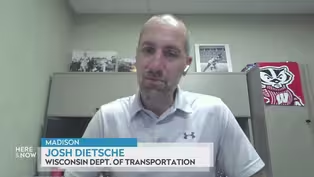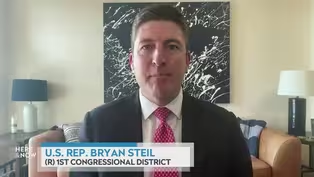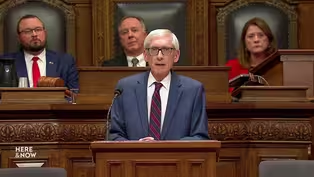Here and Now
Why More Local Pharmacies Are Struggling To Stay In Business
Clip: Season 2400 Episode 2403 | 7m 49sVideo has Closed Captions
Drugstores continue to close, and they point to pharmacy benefit managers as a culprit.
Rx Uncovered: Drugstores across the United States continue to close, and these businesses point to pharmacy benefit managers as a culprit — proposed legislation in Wisconsin aims to limit their scope.
Problems playing video? | Closed Captioning Feedback
Problems playing video? | Closed Captioning Feedback
Here and Now is a local public television program presented by PBS Wisconsin
Here and Now
Why More Local Pharmacies Are Struggling To Stay In Business
Clip: Season 2400 Episode 2403 | 7m 49sVideo has Closed Captions
Rx Uncovered: Drugstores across the United States continue to close, and these businesses point to pharmacy benefit managers as a culprit — proposed legislation in Wisconsin aims to limit their scope.
Problems playing video? | Closed Captioning Feedback
How to Watch Here and Now
Here and Now is available to stream on pbs.org and the free PBS App, available on iPhone, Apple TV, Android TV, Android smartphones, Amazon Fire TV, Amazon Fire Tablet, Roku, Samsung Smart TV, and Vizio.
Providing Support for PBS.org
Learn Moreabout PBS online sponsorshipSteil, thanks very much.
>> Thank you.
>> On health care, we continue our coverage of prescription drug prices, which continue to climb for patients and pharmacies, while coverage of them continues to plummet.
In RX, uncovered "Here& Now", producer Marissa Wojcik examines the complex systems driving these trends.
This week, we look at the impact on pharmacies, both big and especially small, and why their disappearance is hurting patients.
>> We have been in business for over 70 years.
>> The local drugstore was once upon a time a staple in communities across the country.
every month and it's scary, and we think about how how long can we last?
>> Today, whether it's the local drugstore or a chain pharmacy, the brick and mortar presence is dying.
>> The feasibility of having an independent pharmacy is becoming very challenging.
>> Nicole Schreiner is the new CEO of Streu's Pharmacy in Green Bay and president elect on the board of the Pharmacy Society of Wisconsin.
>> We get up in the morning because we want to truly help serve our patients.
>> Alongside her commitment to the mission, she takes on her new dual roles in one of the most challenging times for pharmacies.
From 2010 to 2021, 30% of drugstores in the US closed.
Last year alone, 2300 pharmacies closed, half of them being independent or mid-sized businesses.
issue for patients.
We oftentimes talk about in rural areas.
You know, patients having to travel, you know, perhaps 20 miles to a find a pharmacy that would be able to provide their medications.
And but we're having that even in urban city areas.
>> For some, a visit to the pharmacy is a quick step.
Picking up 1 or 2 prescriptions.
But for many patients, it's much more than that.
>> Your pharmacist a lot of times will be a critical component of your medical care team.
>> Senate President Mary Felzkowski authored legislation trying to help local pharmacies keep their doors open.
>> We saw our small, independent pharmacy starting to go out of business in rural Wisconsin.
When it may take months for a patient to get a clinic visit.
Pharmacists say they bridge that gap.
Available for anyone to walk in and ask questions at any time.
And prevention leads to healthcare savings.
>> For patients with asthma.
We did a study with the Pharmacy Society of Wisconsin and showed that when they sat down with a pharmacist on two 30 minute interventions, that they reduced the number of ER visits, the number of hospitalizations.
These things are making a difference in overall reducing health care dollars spent.
>> Like with most retail stores, it'd be reasonable to assume that internet sales are putting pharmacies out of business.
And while mail order and online retailer giants like Amazon do compete with on site service advocates, diagnose a much deeper and chronic issue.
>> PBMs pharmacy benefit managers have been around for a very long time.
>> Pharmacy benefit managers or PBMs act as middlemen between drug manufacturers, wholesalers, providers, insurance companies and pharmacies.
>> And they've monopolized and they've gotten in between prescribers and the delivery of drugs, driving up the cost of drugs instead of lowering them.
>> The three largest PBM companies accounted for 80% of prescription claims last year.
>> They'll claim that they negotiate with drug manufacturers and prescription drug costs.
However, despite these claims, PBMs regularly inflate what patients pay and force pharmacies to operate a loss.
>> It's become very powerful, and independent pharmacies like myself have no negotiating power anymore.
With these PBMs.
>> The impact of PBMs that PBMs are having on rural pharmacy is staggering.
>> The legislation takes aim at a number of their practices, including not allowing patients to fill prescriptions at certain pharmacies.
>> PBMs dictate where prescriptions can be filled.
>> Punitive audits against pharmacists who inform patients of lower cost options.
>> What to charge a patient.
>> And perhaps the biggest of all for pharmacies.
>> What they will reimburse a pharmacy.
>> Reimbursing the price of medications below cost.
>> And when they'll pay the pharmacy.
>> Forcing them to take losses.
At a Senate health committee hearing, numerous local pharmacies attested to this issue.
>> My pharmacy is currently operating in the red right now solely due to PBM reimbursement rate margins estimated to PBMs have increased by 46%, and during the same time, margins to pharmacies have decreased by 47%.
>> The contracts have become basically take it or leave it.
They've continued to erode year after year after year, and it's estimated that independent pharmacies, depending on your particular location in the country, can have anywhere from 20 to 40% of their claims are actually reimbursed below cost.
>> But not all health industry experts agree.
>> We believe all these provisions will be associated with increased costs to health plans and sponsors.
the bill, such as health insurers, say it will increase prices for health plans.
Employers and patients.
The exorbitant cost of drugs, they say, begins with the drug manufacturers.
>> Instead of taking away the few tools that health plans and employers use to address ever increasing drug prices, the legislature should focus on fixing the market distortion caused by drug manufacturer pricing schemes.
hard on showing them through data from other states that have allowed that have the same legislation, where it's actually lowered the cost of health care.
>> Whatever the cause, the impact on the patient is real, like the ability to obtain diabetes medications.
>> GLP ones, those.
Some pharmacies are just choosing not to carry them because they get reimbursed below their cost.
>> Or having your insurance accepted.
choosing not to carry particular plans because of the poor reimbursement.
>> Every day in my pharmacy, I witness patients facing exorbitant co-pays, sometimes exceeding $500 for medications they cannot afford.
These patients are confused.
They're overwhelmed, and they're forced into impossible decisions about their health.
>> For a patient having to fill prescriptions at multiple pharmacies, the consequences can cost them their lives.
>> Recently, when learned that they had a duplicate prescription that was at another pharmacy from a different doctor.
If they had gone home and taken both, they would have needed emergency care and it could have been fatal.
>> From the extremes of the pandemic to the work they do every day, independent pharmacists say their commitment is to their community.
>> What happens if PBMs continue to drive us out of business?
Who will step up during this crisis?
Who's going to be doing seven day a week testing?
Who's going to deliver meds late at night for a hospice patient who's going to get a call at 2 a.m?
I just got that last week.
It won't be a mail order pharmacy in another state that's doing that.
>> Being able to provide that service to patients and to be part of making sure that they are taken care of, is really what we want to ultimately do.
>> Reporting from green Bay, >> Reporting from green Bay,
Here & Now opening for July 25, 2025
Video has Closed Captions
Clip: S2400 Ep2403 | 1m 5s | The introduction to the July 25, 2025 episode of Here & Now. (1m 5s)
Josh Dietsche on Structural Integrity of Wisconsin Bridges
Video has Closed Captions
Clip: S2400 Ep2403 | 4m 15s | Josh Dietsche on bridges in Wisconsin with nearly 1,000 noted as "structurally deficient." (4m 15s)
US Rep. Bryan Steil on Congress Implementing Trump's Agenda
Video has Closed Captions
Clip: S2400 Ep2403 | 7m 58s | Bryan Steil on the One Big Beautiful Bill Act and pursuing budget rescissions. (7m 58s)
Wisconsin to Have First Open Governor's Race in 16 Years
Video has Closed Captions
Clip: S2400 Ep2403 | 30s | Tony Evers announced that he won't run for reelection in 2026, making for an open contest. (30s)
Crossing the Mississippi River Without the Lansing Bridge
Video has Closed Captions
Clip: S2400 Ep2403 | 4m 19s | The Black Hawk Bridge between Iowa and Crawford County in southwest Wisconsin is closing. (4m 19s)
Providing Support for PBS.org
Learn Moreabout PBS online sponsorship
- News and Public Affairs

Top journalists deliver compelling original analysis of the hour's headlines.

- News and Public Affairs

FRONTLINE is investigative journalism that questions, explains and changes our world.












Support for PBS provided by:
Here and Now is a local public television program presented by PBS Wisconsin




